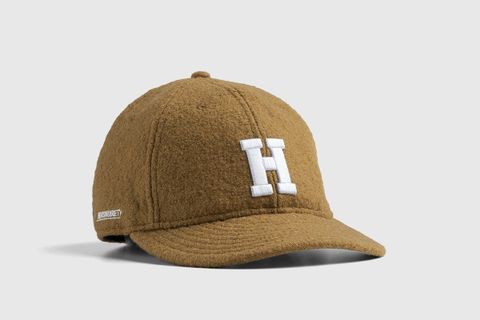Spatial Labs Is Changing the World of "Phygital" Apparel
Iddris Sandu didn’t use the word "community" once in our conversation.
Despite it being web3's favorite buzzword, explaining who’s into his projects isn’t necessary. After Sandu's brand Hardware sold out of its collection of $500 Pantone hoodies (figures often seen only by luxury fashion houses), it’s clear people are already buying into his vision.
What's unique about Hardware is all of its merchandise includes a proprietary chip that tracks who owns the item on Polygon's blockchain, unlocking experiences online and IRL, simply by tapping the chip-embed with your phone.
An example Sandu used is “an artist like Billie Eilish, where (the NFT-embedded sweatshirt) can access a virtual concert, but also be your ticket to get inside a physical show”.
Sandu also notes that collectors have been customizing their chips with Dropbox links, playlists, and Decentraland profiles.
Hardware’s first drop was in-person at Spatial Labs’ keynote in May 2022. Early collectors included stars like Jay-Z (an investor in Spatial Lab via Marcy Venture Projects), Russell Westbrook, and Jayden Smith. For Hardware’s second drop, Spatial Labs will be unveiling its secondary marketplace: LNQ.
Designed to allow people to not only buy and sell physical goods on the blockchain, LNQ also enables users to apply their own digital extras on top of the item.
For example, if Drake bought a Hardware hoodie from LNQ, uploaded a Dropbox file of an unreleased album exclusively into the chip, and then resold it on LNQ’s marketplace, the only person who can listen is the owner of the hoodie.
“This gives us the ability to make the items we have sentimental because you can customize each one,” said Sandu. “Now, the supply and demand of the product is no longer pegged to its scarcity, but a user’s unique experience.”
For those who purchased the first Hardware drop, users will receive an update that enables them to resell their items on LNQ. Sandu credits inspiration from ‘The Tesla Model'.
“Elon Musk is able to increase the stock of Tesla with a simple software update that also makes your car better. How can we do that through fashion?”
Sandu also goes as far as to point out how Spatial Labs’ chip can solve problems for fashion brands around authenticating, validating, and managing counterfeit goods.
“Someone asked what would happen if I buy a real shoe, take the chip out, and then put it into a fake product to try and sell it on LNQ,” explains Sandu. “If we detect an item is fake, we don’t remove the chip. It stays there and we ban it on the network. Now, anyone tapping on that product will immediately see it’s fake.”
Besides helping facilitate authentic transactions, Sandu explains that LNQ also enables brands to split royalties amongst collaborators, like models, and codesigners.
Since the NFT is forever tied to the physical item’s chip, the royalties always go back to the original creators, regardless of what digital extras people swap in and out.
When asked how scalable these proprietary chips are, Sandu states Spatial Labs can do around "2,000,000 chips in three weeks"; which, he also notes, "don't need a battery".
“As a kid, I watched the Apple keynote in 2007, when Steve Jobs unveiled the iPhone,” he continued.
“He took a quote from Alan Kay which is that 'people who are serious about software should make their own hardware'. So, even at a young age, I’ve always said I don’t just want to build software, I want to fundamentally change how hardware interacts. For the first time, this is a fashion brand creating a full omnichannel experience around that.”
This thinking is why Spatial Labs' chip is so widely understood by brands and consumers alike, it's a tool for creators to use in whatever community, ecosystem, or Metaverse they desire.
“The metaverse is very simple. Too many mainstream companies are touting it as this digital escape from reality. Instead, we see the inverse. We see the metaverse as a new way to experience your real world, making it way cooler.”


